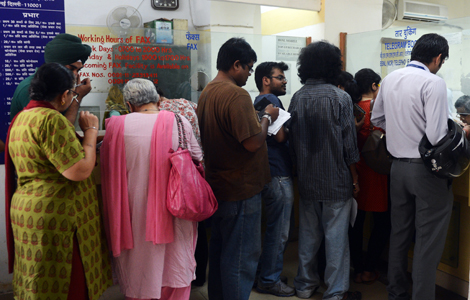Local governments face financing woes
Updated: 2013-07-15 07:39
(China Daily)
|
||||||||
The policy might be good for the economy's long-term benefit, but for some local governments and companies the current situation is painful.
China Rongsheng Heavy Industries Group, the country's largest private shipbuilder, appealed for financial help from the government last week after cutting its workforce and delaying payments to suppliers.
Rongsheng is a typical case of a company suffering from overcapacity and shrinking orders.
Three or four years ago, local governments and banks offered huge loans to companies in industries such as shipbuilding, solar panels, steel and equipment manufacturing, to help them weather the sharp decline in foreign demand. They survived, but now analysts are not sure they can make it again.
Beijing has sent out stern messages. Vice-Premier Zhang Gaoli said in mid-May that China would "strictly forbid" approval of steel, cement, aluminum smelter and shipbuilding projects, and strict financial policies would be implemented to curb overcapacity.
Many local governments, relying heavily on tax revenue from these industries, are feeling the pinch of the "structural adjustment".
From January to May, China's fiscal revenue grew only 6.6 percent year-on-year. Just a year ago, the growth rate was 12.7 percent, and in 2011, it was 24.8 percent.
"Overcapacity and sluggish demand remain the largest problems for our economy," said a mid-year economic report compiled by the government of Nanyang, in Henan province. "Our key enterprises are vulnerable to risks, and our traditionally advantageous industries are in a downturn."
The non-ferrous metal smelting industry, one of the "traditionally advantageous industries" in Nanyang, has slumped by 64 percent in the first five months of this year, as the country's construction boom cooled. Other industries whose output dropped included food processing, equipment manufacturing and power generation.
The overall economic slowdown is a blow, especially to the inland regions, where the economy is largely dependent on energy and resources.
Ordos, a northern city whose economy is dominated by coal-related industries, was hit so hard by the slumping coal prices that its GDP plunged from top spot in the Inner Mongolia autonomous region to the bottom.
Despite the slowdown in industrial output, local governments in general still posted a decent growth in fiscal revenue. From January to May, fiscal revenue at local levels rose 13.4 percent from a year ago.
The reason is that they accelerated their pace of selling land. According to housing brokerage 5i5j, revenue from selling land in the first half of this year for 306 local governments soared by 60 percent to 1.13 trillion yuan ($184 billion).
But economists said the overwhelming reliance on land sales is not sustainable.
Land sales have often been criticized as a source of high housing prices and violent demolitions.
But the problem for local governments is where to find a sustainable revenue source.
On Wednesday, Premier Li Keqiang indicated the government might take steps to support the economy as he emphasized the importance of stabilizing growth and preventing it slipping below the "lower limit". But he did not elaborate what the "lower limit" is.
Citing an anonymous source at a top think tank, China Business News reported that the central government might roll out a "moderate stimulus package" that includes scaling up investment in railways infrastructure and shantytown redevelopment.
Jin Liqun, chairman of the Supervisory Board of Central Huijin Investment Corp, however, said the current priority should be to complete projects unfinished during the previous construction boom, rather than kicking off new ones.
To address the local government's fiscal shortage, the fundamental way is to overhaul the financial relations between China's central and local governments, other experts said.
Lu Feng, a professor of the National School of Development of Peking University, said financial relations should be reformed to give local government enough fiscal power.
- Overcapacity troubles economy, reform needed
- China's auto sector faces overcapacity problem
- For local government debts, transparency seen as a necessity
- More local governments borrowing this year
- Urbanization, growth puts pressure on local governments
- Report alarms over-heated investment by local governments

 US star sprinter fails drug test
US star sprinter fails drug test
 Protests erupt after verdict
Protests erupt after verdict
 Color Run in London promotes healthy living
Color Run in London promotes healthy living
 Urumqi residents hand in weapons
Urumqi residents hand in weapons
 Pool jammed in summer heat
Pool jammed in summer heat
 Last stop for the telegrams of India
Last stop for the telegrams of India
 Heavy rain, strong winds as Soulik heads inland
Heavy rain, strong winds as Soulik heads inland
 8 dead, 19 injured after bus leaves road in Jinghong
8 dead, 19 injured after bus leaves road in Jinghong
Most Viewed
Editor's Picks

|

|

|

|

|

|
Today's Top News
Four GSK China execs held for investigation
Asiana survivors coping with post traumatic stress
China's Q2 GDP growth slows to 7.5%
Canada mourns victims of train accident
Air crash students return to families
Snowden says he won't release harmful US data
Local governments face financing woes
Zimmerman not guilty
US Weekly

|

|






